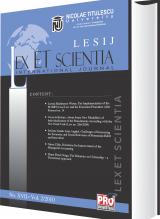PROS AND CONS OF INFLATION TARGETING STRATEGY
PROS AND CONS OF INFLATION TARGETING STRATEGY
Author(s): Mihaela SudacevschiSubject(s): Economy
Published by: Universitatea Nicolae Titulescu
Keywords: inflation targeting; monetary policy; central bank; monetary strategy
Summary/Abstract: The purpose of this paper is to define the inflation targeting strategy and its characteristics. Inflation targeting is a monetary policy strategy in which the central bank projected estimates and makes public, or “target” inflation rate and then, attempts to steer actual inflation towards the target through the use of interest rate changes and other monetary tools. Early proposals of monetary systems targeting the price level or the inflation rate, rather then exchange rate, followed the general crisis of the gold standard after the World War I. Inflation is usually measured as the change of prices for consumer goods, called Consumer Price Index (CPI). Inflation targeting assumes that this figure accurately represents growth or money supply, but is not always the case. The most serious exception occurs when factors external to the national economy are the cause of the price increase. A more essential objection to the strategy of inflation targeting is that it does not really comprise a specific set of monetary policy recommendation would traditional monetarism did, but just constitutes an explicit statement of the aims of the monetary authority.
Journal: LESIJ - Lex ET Scientia International Journal
- Issue Year: XVIII/2011
- Issue No: 2
- Page Range: 228-235
- Page Count: 8
- Language: English

